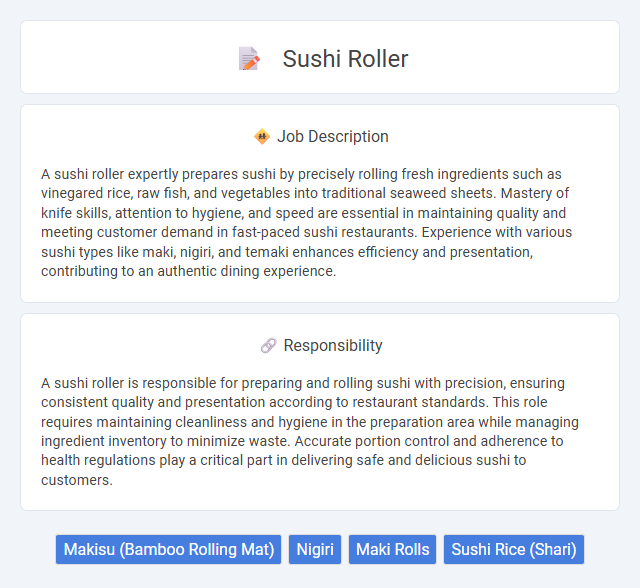
A sushi roller expertly prepares sushi by precisely rolling fresh ingredients such as vinegared rice, raw fish, and vegetables into traditional seaweed sheets. Mastery of knife skills, attention to hygiene, and speed are essential in maintaining quality and meeting customer demand in fast-paced sushi restaurants. Experience with various sushi types like maki, nigiri, and temaki enhances efficiency and presentation, contributing to an authentic dining experience.
Sushi roller jobs may suit individuals who are detail-oriented, have good hand-eye coordination, and can work in fast-paced environments with repetitive tasks. People with steady hands and an ability to maintain consistency under time pressure will likely perform well. Those who prefer varied duties or dislike standing for extended periods might find this role less suitable.
Qualification
A sushi roller job requires proficiency in preparing sushi rolls with precise knife skills and knowledge of various sushi ingredients such as fish, rice, and seaweed. Candidates should have experience in maintaining hygiene standards and complying with food safety regulations in a fast-paced kitchen environment. Strong attention to detail and the ability to work efficiently under pressure are essential qualifications for this role.
Responsibility
A sushi roller is responsible for preparing and rolling sushi with precision, ensuring consistent quality and presentation according to restaurant standards. This role requires maintaining cleanliness and hygiene in the preparation area while managing ingredient inventory to minimize waste. Accurate portion control and adherence to health regulations play a critical part in delivering safe and delicious sushi to customers.
Benefit
Working as a sushi roller likely offers the benefit of developing specialized culinary skills that are valuable in the food industry. There is a strong probability of gaining hands-on experience with fresh ingredients and mastering the art of sushi preparation. This role potentially provides a dynamic work environment with opportunities for creativity and teamwork.
Challenge
Working as a sushi roller likely involves mastering precise knife skills and maintaining consistent roll quality under time pressure. The challenge probably lies in balancing speed with accuracy to meet customer expectations and avoid waste. High-demand periods may require quick adaptation to complex orders, testing both dexterity and focus.
Career Advancement
A sushi roller job offers a valuable entry point into the culinary industry, emphasizing precision, speed, and knife skills. Mastery of sushi rolling techniques and knowledge of ingredient selection can lead to roles such as sushi chef or kitchen supervisor, showcasing career growth potential. Continuous learning and certification in Japanese cuisine further enhance opportunities for advancement within upscale restaurants and global hospitality chains.
Key Terms
Makisu (Bamboo Rolling Mat)
Operating a sushi roller involves expertly using a Makisu, a traditional bamboo rolling mat essential for shaping sushi rolls with precision and consistency. The Makisu's flexible bamboo strips allow for even pressure distribution, ensuring compact, well-formed rolls that maintain their structure during slicing and serving. Mastery of the Makisu technique enhances sushi quality by producing visually appealing rolls with balanced ingredient integration, critical for customer satisfaction in professional sushi preparation.
Nigiri
A Sushi roller specializing in Nigiri expertly shapes vinegared rice with fresh fish slices, ensuring the perfect balance of texture and flavor. Mastery of rice consistency and knife skills is essential for crafting authentic Nigiri that maintains integrity during handling and presentation. Precision and speed are critical to meet high demand while preserving the delicate aesthetics of each piece.
Maki Rolls
Sushi rollers specializing in Maki rolls expertly slice fresh ingredients such as cucumber, avocado, and raw fish before skillfully rolling them in seasoned rice and nori seaweed. Precision and speed are essential to maintain consistent roll thickness and shape, ensuring high-quality presentation and taste. Mastery of traditional techniques and understanding ingredient freshness significantly impact the final product's texture and flavor.
Sushi Rice (Shari)
Sushi rollers expertly handle sushi rice, known as Shari, ensuring it is properly seasoned with vinegar, sugar, and salt to achieve the perfect balance of flavor and texture. They maintain the rice at an ideal temperature and moisture level, critical for binding the sushi ingredients without becoming soggy. Precision in spreading Shari evenly on nori sheets is essential to create aesthetically pleasing and structurally sound sushi rolls.
 kuljobs.com
kuljobs.com